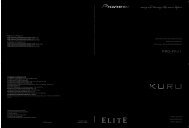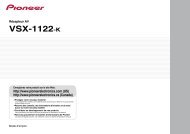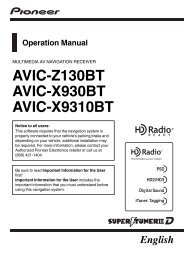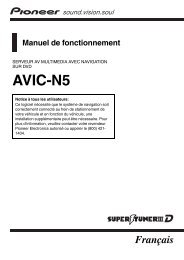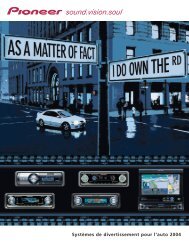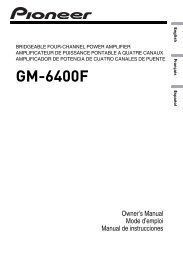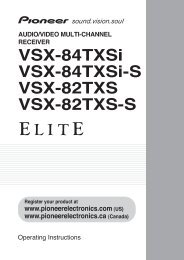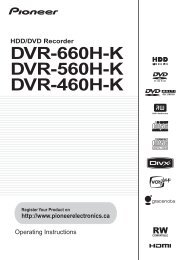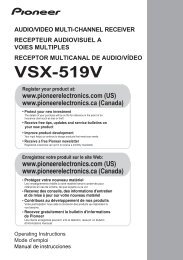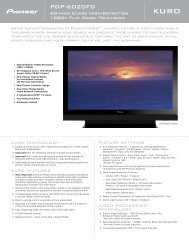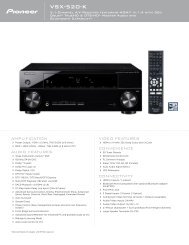BDP-120 - Pioneer Electronics
BDP-120 - Pioneer Electronics
BDP-120 - Pioneer Electronics
Create successful ePaper yourself
Turn your PDF publications into a flip-book with our unique Google optimized e-Paper software.
Licences<br />
intended to guarantee your freedom to share and<br />
change free software - to make sure the software is<br />
free for all its users. This license, the Lesser General<br />
Public License, applies to some specially designated<br />
software packages - typically libraries - of the Free<br />
Software Foundation and other authors who decide to<br />
use it. You can use it too, but we suggest you first think<br />
carefully about whether this license or the ordinary<br />
General Public License is the better strategy to use in<br />
any particular case, based on the explanations below.<br />
When we speak of free software, we are referring<br />
to freedom of use, not price. Our General Public<br />
Licenses are designed to make sure that you have<br />
the freedom to distribute copies of free software (and<br />
charge for this service if you wish); that you receive<br />
source code or can get it if you want it; that you can<br />
change the software and use pieces of it in new free<br />
programs; and that you are informed that you can do<br />
these things.<br />
To protect your rights, we need to make restrictions<br />
that forbid distributors to deny you these rights or to<br />
ask you to surrender these rights. These restrictions<br />
translate to certain responsibilities for you if you<br />
distribute copies of the library or if you modify it.<br />
For example, if you distribute copies of the library,<br />
whether gratis or for a fee, you must give the<br />
recipients all the rights that we gave you. You must<br />
make sure that they, too, receive or can get the source<br />
code. If you link other code with the library, you must<br />
provide complete object files to the recipients, so<br />
that they can relink them with the library after making<br />
changes to the library and recompiling it. And you<br />
must show them these terms so they know their rights.<br />
We protect your rights with a two-step method: (1) we<br />
copyright the library, and (2) we offer you this license,<br />
which gives you legal permission to copy, distribute<br />
and/or modify the library.<br />
To protect each distributor, we want to make it very<br />
clear that there is no warranty for the free library. Also,<br />
if the library is modified by someone else and passed<br />
on, the recipients should know that what they have is<br />
not the original version, so that the original author’s<br />
reputation will not be affected by problems that might<br />
be introduced by others.<br />
Finally, software patents pose a constant threat to the<br />
existence of any free program. We wish to make sure<br />
that a company cannot effectively restrict the users of<br />
a free program by obtaining a restrictive license from<br />
a patent holder. Therefore, we insist that any patent<br />
license obtained for a version of the library must be<br />
consistent with the full freedom of use specified in<br />
this license.<br />
Most GNU software, including some libraries, is<br />
covered by the ordinary GNU General Public License.<br />
This license, the GNU Lesser General Public License,<br />
applies to certain designated libraries, and is quite<br />
different from the ordinary General Public License. We<br />
use this license for certain libraries in order to permit<br />
linking those libraries into nonfree programs.<br />
When a program is linked with a library, whether<br />
statically or using a shared library, the combination<br />
of the two is legally speaking a combined work, a<br />
derivative of the original library. The ordinary General<br />
Public License therefore permits such linking only<br />
if the entire combination fits its criteria of freedom.<br />
The Lesser General Public License permits more lax<br />
criteria for linking other code with the library.<br />
We call this license the “Lesser” General Public<br />
License because it does Less to protect the user’s<br />
freedom than the ordinary General Public License.<br />
It also provides other free software developers Less<br />
of an advantage over competing non-free programs.<br />
These disadvantages are the reason we use the<br />
ordinary General Public License for many libraries.<br />
However, the Lesser license provides advantages in<br />
certain special circumstances.<br />
For example, on rare occasions, there may be a<br />
special need to encourage the widest possible use<br />
of a certain library, so that it becomes a de-facto<br />
standard. To achieve this, non-free programs must be<br />
allowed to use the library.<br />
A more frequent case is that a free library does the<br />
same job as widely used non-free libraries. In this<br />
case, there is little to gain by limiting the free library<br />
to free software only, so we use the Lesser General<br />
Public License.<br />
In other cases, permission to use a particular library in<br />
nonfree programs enables a greater number of people<br />
to use a large body of free software. For example,<br />
permission to use the GNU C Library in non-free<br />
programs enables many more people to use the whole<br />
GNU operating system, as well as its variant, the GNU<br />
Linux operating system.<br />
Although the Lesser General Public License is Less<br />
protective of the users’ freedom, it does ensure that<br />
the user of a program that is linked with the Library<br />
has the freedom and the wherewithal to run that<br />
program using a modified version of the Library.<br />
The precise terms and conditions for copying,<br />
distribution and modification follow. Pay close attention<br />
to the difference between a “work based on the<br />
library” and a “work that uses the library”. The former<br />
contains code derived from the library, whereas the<br />
latter must be combined with the library in order to<br />
run.<br />
TERMS AND CONDITIONS FOR COPYING,<br />
DISTRIBUTION AND MODIFICATION<br />
0. This License Agreement applies to any software<br />
library or other program which contains a notice<br />
placed by the copyright holder or other authorized<br />
party saying it may be distributed under the terms of<br />
this Lesser General Public License (also called “this<br />
License”). Each licensee is addressed as “you”.<br />
A “library” means a collection of software functions<br />
and/ or data prepared so as to be conveniently<br />
linked with application programs (which use some of<br />
those functions and data) to form executables.<br />
The “Library”, below, refers to any such software<br />
library or work which has been distributed under<br />
these terms. A “work based on the Library” means<br />
either the Library or any derivative work under<br />
copyright law: that is to say, a work containing the<br />
Library or a portion of it, either verbatim or with<br />
modifications and/or translated straightforwardly<br />
into another language. (Hereinafter, translation<br />
is included without limitation in the term<br />
“modification”.)<br />
“Source code” for a work means the preferred form<br />
of the work for making modifications to it. For a<br />
library, complete source code means all the source<br />
code for all modules it contains, plus any associated<br />
interface definition files, plus the scripts used to<br />
control compilation and installation of the library.<br />
Activities other than copying, distribution and<br />
modification are not covered by this License; they<br />
are outside its scope. The act of running a program<br />
using the Library is not restricted, and output from<br />
such a program is covered only if its contents<br />
constitute a work based on the Library (independent<br />
of the use of the Library in a tool for writing it).<br />
Whether that is true depends on what the Library<br />
does and what the program that uses the Library<br />
does.<br />
1. You may copy and distribute verbatim copies of the<br />
Library’s complete source code as you receive it, in<br />
any medium, provided that you conspicuously and<br />
appropriately publish on each copy an appropriate<br />
copyright notice and disclaimer of warranty; keep<br />
intact all the notices that refer to this License and to<br />
the absence of any warranty; and distribute a copy<br />
of this License along with the Library.<br />
You may charge a fee for the physical act of<br />
transferring a copy, and you may at your option offer<br />
warranty protection in exchange for a fee.<br />
2. You may modify your copy or copies of the Library<br />
or any portion of it, thus forming a work based<br />
on the Library, and copy and distribute such<br />
modifications or work under the terms of Section<br />
1 above, provided that you also meet all of these<br />
conditions:<br />
a) The modified work must itself be a software<br />
library.<br />
b) You must cause the files modified to carry<br />
prominent notices stating that you changed the<br />
files and the date of any change.<br />
c) You must cause the whole of the work to be<br />
licensed at no charge to all third parties under the<br />
terms of this License.<br />
d) If a facility in the modified Library refers to a<br />
function or a table of data to be supplied by an<br />
application program that uses the facility, other<br />
than as an argument passed when the facility is<br />
invoked, then you must make a good faith effort<br />
to ensure that, in the event an application does<br />
not supply such function or table, the facility<br />
still operates, and performs whatever part of its<br />
purpose remains meaningful. (For example, a<br />
function in a library to compute square roots has a<br />
purpose that is entirely well-defined independent<br />
of the application. Therefore, Subsection 2d<br />
requires that any application-supplied function<br />
or table used by this function must be optional: if<br />
the application does not supply it, the square root<br />
function must still compute square roots.)<br />
These requirements apply to the modified work as<br />
a whole. If identifiable sections of that work are not<br />
derived from the Library, and can be reasonably<br />
considered independent and separate works in<br />
themselves, then this License, and its terms, do not<br />
apply to those sections when you distribute them as<br />
separate works. But when you distribute the same<br />
sections as part of a whole which is a work based<br />
on the Library, the distribution of the whole must be<br />
on the terms of this License, whose permissions for<br />
other licensees extend to the entire whole, and thus<br />
to each and every part regardless of who wrote it.<br />
Thus, it is not the intent of this section to claim rights<br />
or contest your rights to work written entirely by you;<br />
rather, the intent is to exercise the right to control the<br />
distribution of derivative or collective works based<br />
on the Library.<br />
In addition, mere aggregation of another work not<br />
based on the Library with the Library (or with a work<br />
based on the Library) on a volume of a storage or<br />
distribution medium does not bring the other work<br />
under the scope of this License.<br />
3. You may opt to apply the terms of the ordinary GNU<br />
General Public License instead of this License to a<br />
given copy of the Library. To do this, you must alter<br />
all the notices that refer to this License, so that they<br />
refer to the ordinary GNU General Public License,<br />
version 2, instead of to this License. (If a newer<br />
version than version 2 of the ordinary GNU General<br />
Public License has appeared, then you can specify<br />
that version instead if you wish.) Do not make any<br />
other change in these notices.<br />
Once this change is made in a given copy, it is<br />
irreversible for that copy, so the ordinary GNU<br />
General Public License applies to all subsequent<br />
copies and derivative works made from that copy.<br />
This option is useful when you wish to copy part of<br />
the code of the Library into a program that is not a<br />
library.<br />
4. You may copy and distribute the Library (or a<br />
portion or derivative of it, under Section 2) in<br />
object code or executable form under the terms<br />
of Sections 1 and 2 above provided that you<br />
accompany it with the complete corresponding<br />
machine-readable source code, which must be<br />
distributed under the terms of Sections 1 and 2<br />
above on a medium customarily used for software<br />
interchange.<br />
If distribution of object code is made by offering<br />
access to copy from a designated place, then<br />
offering equivalent access to copy the source code<br />
from the same place satisfies the requirement to<br />
distribute the source code, even though third parties<br />
are not compelled to copy the source along with the<br />
object code.<br />
5. A program that contains no derivative of any portion<br />
of the Library, but is designed to work with the<br />
Library by being compiled or linked with it, is called<br />
a “work that uses the Library”. Such a work, in<br />
isolation, is not a derivative work of the Library, and<br />
therefore falls outside the scope of this License.<br />
However, linking a “work that uses the Library” with<br />
the Library creates an executable that is a derivative<br />
of the Library (because it contains portions of the<br />
Library), rather than a “work that uses the library”.<br />
The executable is therefore covered by this License.<br />
Section 6 states terms for distribution of such<br />
executables.<br />
When a “work that uses the Library” uses material<br />
from a header file that is part of the Library, the<br />
object code for the work may be a derivative work<br />
of the Library even though the source code is not.<br />
Whether this is true is especially significant if the<br />
work can be linked without the Library, or if the work<br />
is itself a library. The threshold for this to be true is<br />
not precisely defined by law.<br />
If such an object file uses only numerical<br />
parameters, data structure layouts and accessors,<br />
and small macros and small inline functions (ten<br />
lines or less in length), then the use of the object file<br />
is unrestricted, regardless of whether it is legally a<br />
derivative work. (Executables containing this object<br />
code plus portions of the Library will still fall under<br />
Section 6.)<br />
Otherwise, if the work is a derivative of the Library,<br />
you may distribute the object code for the work<br />
under the terms of Section 6. Any executables<br />
containing that work also fall under Section 6,<br />
whether or not they are linked directly with the<br />
Annexe<br />
55



